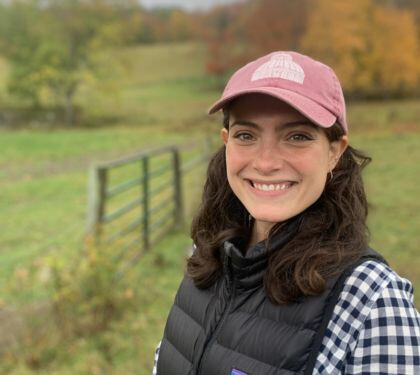Farmer-Led Innovations in Tillage Reduction: New England Organic Farmers Lead the Way
Organic farmers have long been at the forefront of sustainability. Yet while organic farming avoids synthetic chemicals, organic farmers often rely on intensive tillage to manage weeds and prepare fields. This practice — three times more frequent than on conventional farms — can degrade soil health over time.
Across New England, a group of organic farmers decided to take this challenge head-on. Through American Farmland Trust’s Farmer Led Innovations (FLI) in Tillage Reduction project, seven farms in Maine and Massachusetts worked together over two years to experiment, adapt, and share strategies to reduce tillage while maintaining productivity.
The results? Creative solutions, valuable lessons, and a stronger community of farmer-to-farmer learning.
Innovation in Action: Farm Highlights
Goranson Farm, Dresden, ME
Faced with significant weed pressure, Goranson Farm found success with specialized equipment. A speed disk and a Yeoman’s plow helped them cut back on passes across the field and reduce soil inversion, while saving fuel and time. They’re also experimenting with living mulches between garlic and strawberry beds to cut costs and conserve water.
Andrews Farm, Gardiner, ME
On their small hilltop fields, Mike and Jess Perisho developed a four-year rotation to steadily reduce tillage. By integrating tools like a roller crimper and experimenting with compost mulch, they’ve built soil health while reducing labor.
Crystal Spring Farm, Brunswick, ME
For carrot production, Seth Kroeck is using late-planted heavily sown oats in a surprising way. Sown in October at about twice the usual seeding rate, they form a short, dense mat that winter-kills, providing winter residue while setting the stage for reduced-till carrots in spring. “Having an easier spring turnover of residue lets us minimize tillage when it matters most,” farmer Seth Kroeck explained. The farm is also experimenting with growing their own cover crop seed to cut costs and strengthen local seed systems.
Freedom Food Farm, Raynham, MA
On sandy soils, moisture and nutrient retention are constant hurdles. Chuck Currie has embraced a closed-loop system, harvesting mulch from cover crops and pastures to recycle nutrients and suppress weeds. This shift required reducing crop diversity — but it has made the farm more resilient and less reliant on external inputs.
Atlas Farm, Deerfield, MA
Flooding in 2023 tested Atlas Farm’s experiments with teff, a fast-growing summer cover crop. Where bare soil aisles washed out, teff held firm, preventing erosion. The farm also saw strong squash yields from strip-tilling into living clover, proof that soil health practices can pay off even in tough years.
Island Grown Initiative, Vineyard Haven, MA
This nonprofit farm used FLI support to refine zone tillage, clover mulches, and cover crop strategies. Not everything worked — heavy cover crop biomass clogged equipment, and tarping clover sometimes killed it off. But their persistence with zone building is paying off, especially in balancing soil health with productivity.
Crimson & Clover Farm, Florence, MA
Nate Frigard has been testing long-term clover fallows and furrow planting. While some high-value crops struggled in living mulch, others thrived. The big takeaway: soil fertility and reduced weed pressure improved dramatically after multi-year clover covers, prompting Nate to integrate them into long-term crop planning.
The Power of Peer Learning
A common thread across the project was the value of farmers learning directly from one another.
“Farmers take a gigantic risk when they try new things, so to have real examples of what worked and what didn’t from other growers gives you a lot more confidence to try it out on your farm.”
Traditional resources often highlight success stories but leave out the failures. FLI created space for farmers to openly share what didn’t work, saving others from repeating costly mistakes. These conversations built trust, inspired experimentation, and turned isolated trials into collective progress.
Looking Ahead
With foundational support from funders including Organic Valley’s Farmers Advocating for Organic Program and the Massachusetts Department of Agricultural Resources, the success of the FLI project helped AFT secure an NRCS Conservation Innovation Grant and matching donor funds to expand into Connecticut with a new cohort of farmers. The goal: to spread these farmer-led innovations across New England and help organic farms thrive amid a changing climate.
As Chuck Currie of Freedom Food Farm put it: “Don’t be afraid to try things. Don’t be afraid to fail. That’s how you learn.”
Read the full report at farmland.org/farmer-led-innovations.






